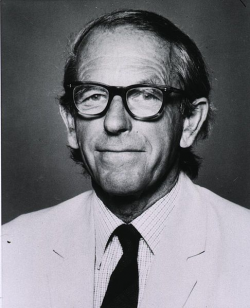Fred Sanger

- Born
- 13 August 1918
- Died
- 19 November 2013 (age 95)
Genomics is a field of genetics that aims to sequence and analyse the structure and function of the genome of an organism (the complete DNA within the organism). Fred Sanger developed a technique to sequence DNA (work out the order in which the 4 bases adenine, thymine, cytosine and guanine were arranged in DNA). This technique has been a fundamental tool to researchers. Sanger’s sequencing technique was used to determine the sequence of bases in human DNA in the 1990 Human Genome Project.
Fred Sanger was born in 1918 the second of three children, his father Frederick was a GP. Sanger had a Quaker upbringing. He studied at Bryanston School in Dorset, then at St John’s College, Cambridge. It was whilst studying at Cambridge that he met his wife Joan Howe. Sanger, a pacifist, was a conscientious objector in the Second World War and he was allowed to continue with the research for his PhD. Sanger entered into a very successful career in research, winning the Nobel Prize for Chemistry twice.
In 1958 Sanger was awarded a Nobel prize ‘for his work on the structure of proteins, especially that of insulin’. Insulin is a hormone which is secreted by the pancreas and is implicated in type 1 and type 2 diabetes. Type 1 occurs when little or no insulin is produced in the pancreas and type 2 occurs when insulin production is impaired and there is resistance to the insulin that is produced. When Sanger determined the amino acid sequence of this protein it was the first protein ever to be sequenced. Subsequently in the early 1960s researchers were able to produce insulin in a laboratory.
Sanger’s second Nobel prize was awarded in 1980 jointly with Walter Gilbert ‘for their contributions concerning the determination of base sequences in nucleic acids’.
The sequencing technique developed during this work allowed researchers to make advances in the field we now call genomics. The field has quickly moved on from early aims such as sequencing the human genome, to research into tailoring medicines to the individual based on their unique DNA sequence.
Many accolades were offered to Sanger in his lifetime. As well as his two Nobel prizes, he also accepted the honour of having the Sanger Institute in Cambridge named after him, but warned that ‘it had better be good’. He turned down a knighthood though preferring not to be called ‘Sir’ and stating that
A knighthood makes you different, and I don't want to be different
He did however accept the order of merit.
Many researchers, and those whom their research has helped, owe a great deal to this brilliant and yet humble scientist who continued to regard himself as a student and continued to learn. He felt that in providing ‘a peaceful and happy home’, his wife Joan, contributed more to his work than anyone else.
This page was written by a Biology: Changing the World volunteer.



